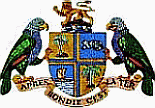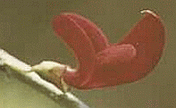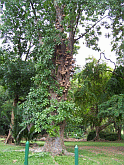
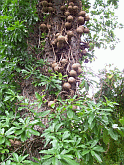



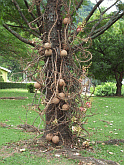
|
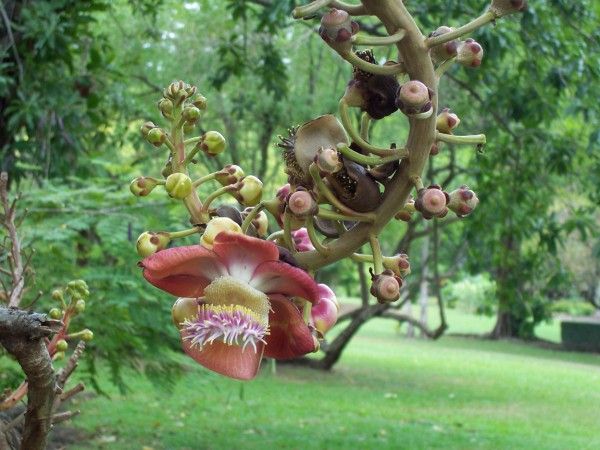 Francis Richards
Francis Richards
Plant Family: Member of the Lecythidaceae family, other members include the Brazil Nut (Bertholletia excelsa) and Paradise Nut (Lecythis zabucajo).
Description: A large, tropical tree, up to 23 m (75 ft) tall, with thick, tough bark; leaves up to 15 cm (6 in) long, are simple with serrate margins; tree bears remarkably striking long woody racemes 1-2 m (3-6 ft) in length, crowded along the trunk from the base upwards, with large, complex, pink, yellow and white fleshy flowers, 8-13 cm (3-5 in) across, seeming to grow directly on the stem; flowers with exposed reproductive organs, have sweet-smelling odour which attract bats and other pollinating agents feeding on the nectar; the few fertile flowers develop into a large, heavy, hard-shelled, globose, brown fruit, borne on long tangled stalks on main stem below foliage branches, take 8-9 months to ripen, growing as big as a man's head, look like big, rusty Cannon Balls, hence the name; when ripe these Cannon Balls fall to the ground and break open, giving off a putrid scent.
Natural Habitat: Tropical and semi-tropical regions with moderate to heavy rainfall.
Origin and Distribution: Indigenous to rainforest of the Guianas in Northeastern South America; a popular ornamental in Caribbean and SE Asian botanic gardens.
Uses: Primarily ornamental; fruits edible and occasionally eaten, but smell of white flesh discourages most people; fruit shells sometimes used as utensils; some fractions of the stem, bark and flowers exhibit antimicrobial activity.
References:
G.W. Lennox and S.A. Seddon. Flowers of the Caribbean. Macmillan, London 1978
H.F. Macmillan. Tropical Planting and Gardening, Macmillan, London 1956
US National Tropical Botanical Gardens, (ntbg.org). Kalaheo, Hawaii, 2004 |
